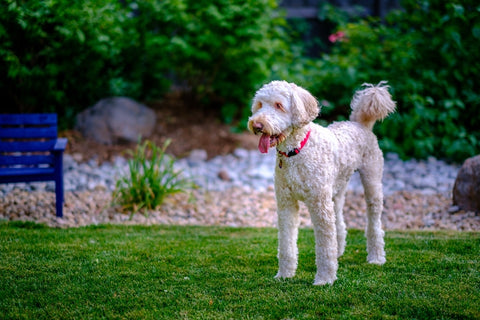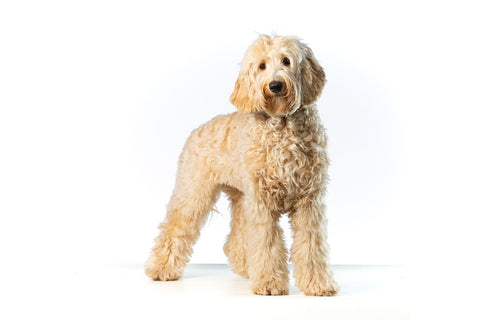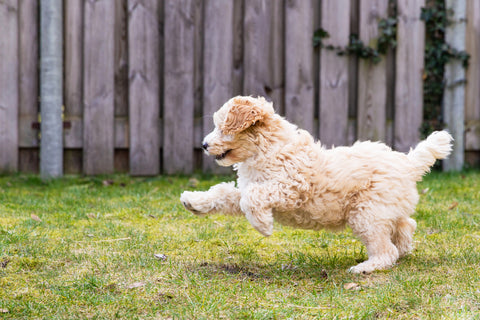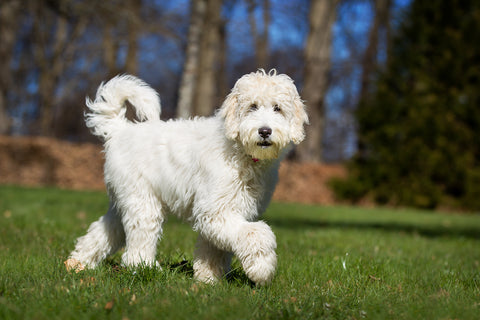Activity Level: High
Hypoallergenic: Yes
Social Ability: Social & Friendly
Skills: Service, Companionship
Intelligence: Above Average
Ideal Climate: Moderate Warm, Temperate, or Moderately Cold
A beautiful blend of Poodle and Labrador genes, the Labradoodle is an elegant canine with a tall stature, a stoic look, and a big heart. With ample play time, exercise, and care, your Cream Labradoodle will bring a whole lot of sunshine to your home.
Breed Overview
 Origin: The word Labradoodle was first coined in 1955 by Donald Campbell in reference to his Labrador/Poodle mix dog, whose name has been lost to history. This genetic combination was replicated elsewhere in the following years, but reliable sources are unfortunately scant. Decades later in 1989, Australian breeder Wally Conron brought a Labradoodle to the Royal Guide Dog Association of Australia after one Labradoodle in his care fit the bill for the ‘perfect,’ hypoallergenic, intelligent service dog.
Origin: The word Labradoodle was first coined in 1955 by Donald Campbell in reference to his Labrador/Poodle mix dog, whose name has been lost to history. This genetic combination was replicated elsewhere in the following years, but reliable sources are unfortunately scant. Decades later in 1989, Australian breeder Wally Conron brought a Labradoodle to the Royal Guide Dog Association of Australia after one Labradoodle in his care fit the bill for the ‘perfect,’ hypoallergenic, intelligent service dog.
Many years later, Conron would express his remorse at this introduction of the breed to the public, claiming the subsequent breeding habits ended up, in his words, “creating a Frankenstein” rather than achieving the ‘perfect’ dog they were promised. The trend of breeding for ‘designer’ dogs began in the 1950s with the origin of the Cockapoo, and the practice has affected several other breeds—Poodles, Pugs, and Retrievers, just to name a few. Luckily, the Labradoodle skirted some of the worst efforts in ‘designer’ breeding at the end of the millennium in favor of breeding them as service canines. The result is a generally healthy and intelligent dog with potential for companionship, service, and anything in between.
 History: As one of many popular mixed breeds, Labradoodles are not considered an official breed by the American Kennel Club, but owners may get their dog an AKC identification number if their parents are both recognized breeds. At the same time, many Australian and international organizations do recognize the Labradoodle as an established breed. After the Association for the Blind of Western Australia brought Labradoodles into their training program, these canines have been used as guide, therapy, and service animals all over the world.
History: As one of many popular mixed breeds, Labradoodles are not considered an official breed by the American Kennel Club, but owners may get their dog an AKC identification number if their parents are both recognized breeds. At the same time, many Australian and international organizations do recognize the Labradoodle as an established breed. After the Association for the Blind of Western Australia brought Labradoodles into their training program, these canines have been used as guide, therapy, and service animals all over the world.
Every mixed breed can come with its fair share of inherited genetic issues, but most breeders follow specific practices to ensure maximum genetic diversity. Breeding F1 hybrids, whose parents are a Poodle and a Labrador, leads to better genetic odds than F2 hybrids, whose parents are both Labradoodles. If you are looking to add a Labradoodle to your home, remember to adopt rather than shop, and keep in mind that genetic testing by your veterinarian can help detect inherited health problems early.
Breed Attributes
 Temperament: These dogs aren’t beloved for just their cute faces! Labradoodle temperaments tend to be very affectionate and sweet, as well as highly adaptable, so they can thrive just about anywhere. Ideally, every dog should have ample space to play and run, but these dogs are known to do well in apartments and adjust to alone time with training. Doodles have high energy levels and therefore need plenty of exercise and play time indoors or outdoors. This exuberant nature makes them great family pets and playful companions.
Temperament: These dogs aren’t beloved for just their cute faces! Labradoodle temperaments tend to be very affectionate and sweet, as well as highly adaptable, so they can thrive just about anywhere. Ideally, every dog should have ample space to play and run, but these dogs are known to do well in apartments and adjust to alone time with training. Doodles have high energy levels and therefore need plenty of exercise and play time indoors or outdoors. This exuberant nature makes them great family pets and playful companions.
Because of their affectionate nature, Labradoodles are great companions and family pets, but not great guard dogs. Some canines can sometimes be either standoffish or friendly depending on the situation, but Doodles almost exclusively tend toward friendliness. This caring nature extends to pals of all species, including children and other dogs, but training is still essential for any dog.
Personality: These canines have been bred for their intelligence and calm attitude, so it is in their nature to be gentle and sweet. While every dog is different, you can bet your Labradoodle will enjoy affection and snuggling as much as they enjoy running and playing.
These loyal and alert dogs are relatively easy to train as well, as they are eager to please their owner or handler and are often very aware of their surroundings. Early training and socialization are key for all dogs, not only to teach them obedience but also to promote calmness; untrained dogs can exhibit anxious and destructive behavior when they feel out of control, and training helps them feel calm under your command or when alone.
Ideal Owner: You! Labradoodles thrive with plenty of family and friends of all species, and their above-average intelligence means they tend to do well alone. Whether in a cozy apartment or a big farm with plenty of space, a Labradoodle can adapt and get comfy just about anywhere—as long as you’re by their side.
Fur Care

Grooming: The average Labradoodle’s coat is thick but not incredibly so, meaning they can tolerate colder and warmer weather. A thick-bristled brush is recommended for daily use to comb out the undercoat and stimulate skin cells to promote healthy circulation. As with most mixed breeds, their genetics allow for variations, including a so-called ‘undesirable coat’ for a Doodle. This iteration of blended genetics gives the dog a flatter, straighter coat than archetypal curls. This trait is uncommon but still beautiful and relatively easy to take care of.
Ear care is just as important as skin care! Canine breeds with thick fur and long ears may need daily or weekly ear cleanings to keep infections and other issues at bay. Veterinarians recommend gentle ear flushes to rinse out debris, dead skin, and allergens; our Labradoodle Ear Cleanse with Aloe Vera helps flush the ear canal and deodorize without stinging.
Shedding: Owing to their blend of low-shedding genetics, most Labradoodles are considered hypoallergenic. However, as with all mixed breeds, each Doodle has a different set of inherited traits, which may make them shed enough dander to be considered allergenic. Labradoodle shedding can be managed with daily brushing. Regular bathing is essential to remove the undercoat, nourish the entire haircoat, and keep skin clean, for which many veterinarians recommend a gentle soap-free dog shampoo.. Our Labradoodle Oatmeal Aloe Shampoo is a best-selling option that also provides vitamins and proteins to maintain skin and fur health.
Colors: Chocolate, Cream, Golden
More to Know: Labradoodles are one of only a few breeds trained for Psychiatric Service, a highly specialized type of service position. These canines assist people with all sorts of health conditions, including pediatric mental illnesses.
Health

Common Issues: With responsible breeding practices, F1 hybrid Labradoodles tend to be generally healthy, owing to their more unique set of genes. F2 hybrids may have a higher risk of health problems, but genetic testing and regular veterinarian visits will help you manage your pet’s health.
Labradoodles are susceptible to a few common health issues many canines experience, but these issues still must be evaluated by a veterinarian. These canines may inherit ocular issues, most notably Progressive Retinal Atrophy (PRA), a condition that can lead to blindness. There is also evidence suggesting that Doodles have a higher risk of Multifocal Retinal Dysplasia (MRD) and Cataracts, which can be caught and addressed early by your vet.
Joint dysplasia, an inherited condition affecting the joint tissues, is common among many large and mixed breeds. Doodles have a high energy level and above-average exercise requirements, so their joint health should be monitored at all ages, especially in their senior years. Joint health is essential for these pups, and a daily supplement with nourishing ingredients can support the structure and function of the joints. Our Labradoodle Z-Flex Max Joint Support Chews are a great option for supplementation with Chondroitin, Glucosamine, and MSM in an easy-to-administer soft chew.
 Nutrition: All dogs need a healthy, balanced diet, and Labradoodles are no exception. With their high exercise requirements, these dogs need plenty of high-quality proteins in their diet to maintain muscle mass and mobility. Great sources include chicken, beef, pork, and fish.
Nutrition: All dogs need a healthy, balanced diet, and Labradoodles are no exception. With their high exercise requirements, these dogs need plenty of high-quality proteins in their diet to maintain muscle mass and mobility. Great sources include chicken, beef, pork, and fish.
Veterinarians often recommend a daily multivitamin for all canines to ensure they get their vitamins and minerals. Our Labradoodle Multi-Tabs Plus daily supplement is a fantastic option with a veterinarian-approved formula and high-quality ingredients.
Lifespan: 12-14 years
Physical Activity
 Training: Early socialization and training is essential for all dogs, and Labradoodles are one of many breeds with a proclivity for obedience. These eager canines tend to pick up on training with ease, which helps them perform as service animals of many calibers. From therapy to guiding to medical alerts, Doodles can be professionally trained to perform numerous tasks for their owner.
Training: Early socialization and training is essential for all dogs, and Labradoodles are one of many breeds with a proclivity for obedience. These eager canines tend to pick up on training with ease, which helps them perform as service animals of many calibers. From therapy to guiding to medical alerts, Doodles can be professionally trained to perform numerous tasks for their owner.
Training any dog is a vital step in helping them manage anxiety, especially if they spend a lot of time alone. Feeling calm and confident are just two of many benefits of proper training, and obedience training helps keep your loyal Doodle by your side and following your command.
Exercise: With highly active Poodle genes, Labradoodles need plenty of exercise and mental stimulation to maintain wellness. Ideally, a large dog such as a Doodle should have ample outdoor and indoor space to roam, but they are known to adapt to smaller spaces provided they can run freely outdoors.
Mental activity is just as important as physical activity for most dogs, especially Doodles with above-average intelligence. This means that Doodles require engaging toys and play to stay healthy. Interactive, treat-dispensing, and battery-powered toys are great options to keep your pup’s mind occupied, which may help stave off anxious or destructive behavior caused by boredom.

Labradoodles are beloved companions and loyal service animals, whose big hearts make them excellent family pets. Your Doodle is ready to play and already thinking about snuggling afterwards.

